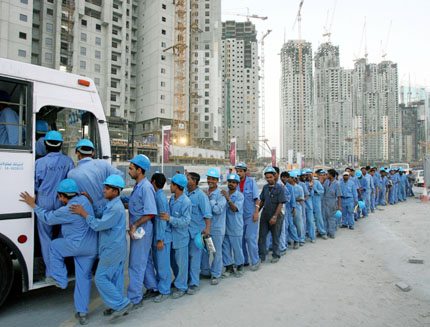RELATED ARTICLES: 64,944 firms comply with midday ban | 312 firms found violating UAE summer midday break rules | Bill Clinton advocates for New York University, UAE government
UAE’s Ministry of Labour (MoL) announced the midday break in the UAE will be enforced starting 15 June 2014, preventing labourers from undertaking any work in direct sunlight between 12:30 PM and 3:00 PM; this rule is expected to be enforced till 15 September, 2014.
“The midday work ban has entered its tenth year now, confirming the Ministry’s commitment towards human and labour rights by ensuring them work in a suitable and safe environment,” Mubarak Saeed Al-Dhaheri, under-secretary of the MoL said. “This is considered one of the most prominent and important initiatives which handles preventive measures to protect workers from the risks of working under direct sunlight with extreme high temperatures.”
The rule requires business owners to completely halt operations, and provide shaded areas for the workers during the break period. Additionally, owners also have to adapt to eight daily working hours, and compensate those labourers who work overtime. If workers, irrespective of their professions, are found working in direct sunglight, then their violator employers will be fined $4,083 (AED15,000), Al-Dhaheri added.
“Moreover, if the issue is involving a huge number of workers on the recorded worksite, the company’s profile will be sent to the minister’s office, where it might face temporary suspension from operations plus a reduction in its classification level,” he said.
Exceptions under this new directive, however, include those working on technical operations which require continuous work to be undertaken during the break period. “Businesses excluded from the banned working hours include work on mixed asphalt and poured concrete if it is impossible to implement or supplement the work in one day,” Al-Dhaheri said, “or carrying out work to prevent expected danger or reparation or damage or malfunction or loss.
Also included in the exceptions are labourers undertaking “emergency work, including cutting power lines, water supply, sewerage, electricity and cutting off or redirecting traffic or blocking public roads in addition to cut gas or petroleum pipelines,” Al-Dhaheri added.
Maher Al Obed, assistant under-secretary for the MoL’s inspection department informed specialised teams have been created to ensure the new directives are followed, and inspections will include random visits along with awareness campaigns to stress the directive’s importance. “We have formed 18 teams of specialised inspectors to follow up on this particular issue, making sure that all companies are following the decision correctly.
“There will be around 80,000 visits during the midday break period for the next three months, in which 60,000 visits will be inspectional and 20,000 for the awareness campaign,” he added.

